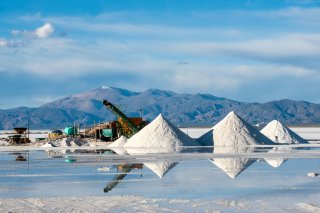The Rising Geopolitical Importance of Argentine Lithium
Whoever wins this year’s Argentinian elections will have a say in whether the federal state plays a larger role or if the country will maintain an investment regime that is open to foreign investment. Foreign governments are watching closely.
China has also heavily invested in Argentina, complete with suggestions that the South American country join the BRICS (Brazil, Russia, India, China, and South Africa) club and a recent agreement for trade between the two nations to be conducted in yuan. China is Argentina’s second-largest trade partner after Brazil and has lent Argentina $17 billion for a wide range of infrastructure projects, many of which have been troubled by local labor and environmental issues. China also reportedly has some type of bases (supposedly linked to its space program) in the country, and Chinese companies are actively engaged in the lithium sector. Although Argentina represents a challenging environment for Chinese companies, it maintains an important geoeconomic importance, especially in terms of its natural resources. What is going on in Argentina, including the debate over the lithium production regime, is of considerable interest to Beijing.
Although Argentina’s economic crisis dominates its electoral politics, the lithium sector is enjoying considerable success, in part due to the successful handling of the business by the three major provincial governments where it is produced. Whoever wins the 2023 elections will have a say in whether the federal state plays a larger role or if Argentina will maintain an investment regime that is open to foreign investment. Argentina has a window of opportunity to make good in the lithium sector, but it needs to maintain a pragmatic approach to achieve the greatest value it can for the country and keep foreign investment positively engaged.
Dr. Scott B. MacDonald is the Chief Economist for Smith’s Research & Gradings, a Fellow with the Caribbean Policy Consortium, and a Research fellow with Global Americans. Prior to those positions, he worked for the Office of the Comptroller of the Currency, Credit Suisse, Donaldson, Lufkin and Jenrette, KWR International, and Mitsubishi Corporation. His most recent book is The New Cold War, China and the Caribbean (Palgrave Macmillan 2022).
Image: Ksenia Ragozina/Shutterstock.

